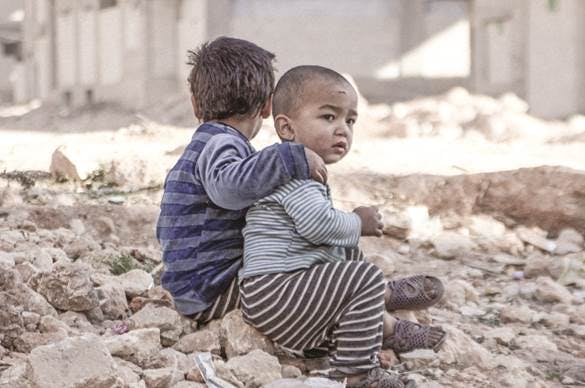March 15 marks a tragic milestone: five years of conflict in Syria, which has left more than 13 million people in need of humanitarian assistance and forced more than half of Syrians to flee their homes.
Behind these numbers are real people who have had to leave everything behind. United Nations agencies and other humanitarian aid organizations are working to provide food, shelter, medicine, clean water, and other vital aid to families in need. These organizations need our support. To date, the 2016 Syria Humanitarian Response Plan is only 4% funded.
 © UNICEF/UN013172/Al-Issa
© UNICEF/UN013172/Al-Issa
The heads of several UN humanitarian agencies and leaders of other humanitarian groups released a joint statement last week, calling for “safe, unimpeded access” to deliver humanitarian aid and for an end to the suffering. They ended their statement, saying:
“No one wants to see a sixth year of conflict start on 15 March. Young people across Syria need to hope and believe that their future lies in their homeland. That they will have education, healthcare, homes and jobs. That life holds more than fear, violence and hunger.
“We use our collective voice to call on all parties, local and international, for this anniversary to be the last one and for the political talks to bring real peace and an end to the suffering in Syria.”
Here are some of the ways the UN is helping families in crisis – and how you can support this work.
– The UN Office for Coordination of Humanitarian Affairs (OCHA) coordinates humanitarian action to assist Syrians in need. This includes technical support, planning, and the mobilization of resources so organizations on the ground can provide life-saving aid. OCHA also provides funding to relief organizations working to provide life-saving aid.
Donate to the Syria Humanitarian Fund managed by OCHA.
Get the latest information on the humanitarian impact of the crisis in Syria.
– The UN Children’s Fund (UNICEF) and partners have provided more than 10 million people living in Syria and in neighboring countries with clean drinking water and over 1 million children with psychosocial support services. UNICEF and partners have also helped vaccinate nearly 20 million children against polio. UNICEF is also helping displaced children access learning materials and schools.
Read UNICEF’s report, “The Impact of Five Years of War on Syria’s Children and Their Childhoods.”
– The World Food Programme (WFP) feeds around 4 million people every month inside Syria and provides food assistance and food vouchers to close to 1.5 million Syrian refugees in neighboring countries. Since the start of the Syrian crisis, WFP has delivered more than 1 million metric tons of food to displaced families.
Join WFP’s #IamSyrian campaign to share the stories of real people affected by the conflict.
– The UN Refugee Agency (UNHCR) works to provide shelter and protection to Syrians who have fled their homes. Among the aid UNHCR provides is cash for medicine and food, stoves and fuel for heating, insulation for tents, thermal blankets, and winter clothing. According to UNHCR, since January alone, 1.8 million refugees received food aid, 500,000 children were enrolled in school, and shelter in camps was provided for more than 460,000 refugees.
Learn more about UNHCR’s efforts to help displaced Syrians.
– The UN Population Fund (UNFPA) and partners have provide reproductive health services to more than 300,000 women in Syria and in neighboring countries. UNFPA and partners also provide hygiene kits and gender-based violence services, as well as support emergency obstetric care, helping to deliver thousands of babies.
Donate to UNFPA’s humanitarian response work.
Learn more about UNFPA’s work to help Syrians.
– The World Health Organization (WHO) provides medical aid and supplies to Syrians in need as access to health care has diminished and supplies have dwindled in the country. In 2015, WHO delivered 17.2 million medical treatments in Syria for patients grappling with diseases and injuries. WHO also helps train workers and supports mobile clinics that can provide basic health care. Working with UNICEF and partners, WHO also supports immunization against polio and measles.
Read about WHO’s work in Syria.
– The UN Development Programme (UNDP) is working with partners to support vulnerable populations displaced by the conflict and is working to integrate the long-term needs of individuals into response efforts. This includes helping to provide job and other income-earning opportunities and addressing infrastructure challenges.



 View All Blog Posts
View All Blog Posts